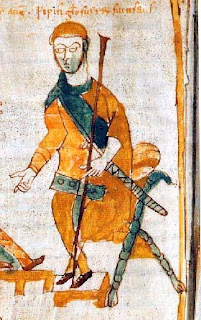About 781, while on a trip to Rome, Charlemagne had Carloman baptized by the pope and re-named Pepin. This was a slap in the face to Pepin the Hunchback, Charlemagne's oldest son by his concubine Himiltrude, who was now effectively "replaced" by another heir who carried a dynastically important name (Charlemagne's father was Pepin the Short).
On this occasion of his re-christening he also was crowned by Pope Adrian I with the Iron Crown of Lombardy, and made King of Italy by his father. Although still a child, his reign was aided by those allies wishing to please Charlemagne. With Duke Eric of Friuli (the brother of Pepin's mother), he prevailed against the Avars (Eurasian nomads inhabiting the areas northeast of Italy), taking their capital fortress, the Ring of the Avars.
Several poems praising him and his conquests were composed during his lifetime. After 799 his capital was Verona, and it became a center of literature and the Carolingian Renascence. An unsuccessful siege of Venice might have contributed to his death. Six months of hanging around the swamps outside Venice created disease in the army. Pepin died a few months later, on 8 July 810.
Pepin had five daughters and a son, Bernard, who became King of Italy after him. Because Pepin pre-deceased his father, however, the third of the Frankish kingdom that he would have inherited was up for grabs. Since his brother Charles the Younger, a co-inheritor, died a year and a half later, also prior to Charlemagne's death, there was one option left for Charlemagne's empire: Louis, who will (finally) get his own entry (after numerous mentions in this blog) tomorrow.

No comments:
Post a Comment
Note: Only a member of this blog may post a comment.